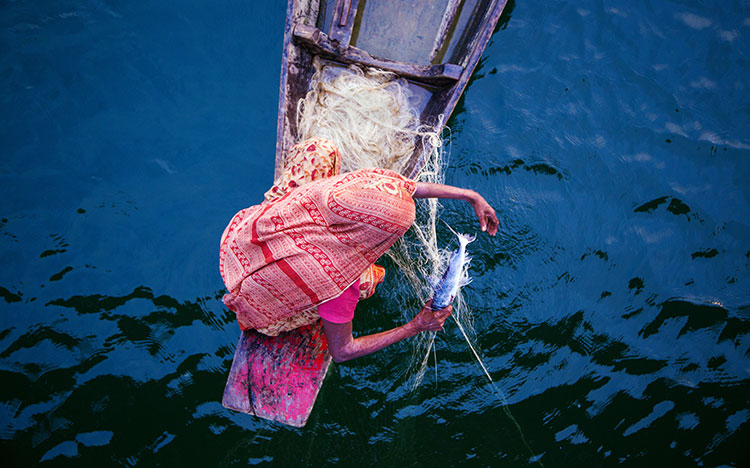Oceans
Climate change, overfishing, pollution, and other human-created challenges are causing catastrophic damage to the world’s oceans—and also threatening the health and well-being of the hundreds of millions of people who depend on oceans’ resources. Nicholas Institute experts are advancing efforts to strengthen ocean health for shared prosperity.
Highlight
Duke Researchers Share Insights on Small-Scale Fisheries
The global Illuminating Hidden Harvests study provides the most complete picture to date of the multifaceted contributions of small-scale fisheries to coastal and inland communities around the world. Since the study’s publication in 2023, Duke University continues to partner with the Food and Agriculture Organization of the United Nations (FAO) and WorldFish to produce resources and actionable research to better inform governance of small-scale fisheries for sustainable development, including as major sources of food, nutrition, and income.
Supporting Data Collection Efforts
A free e-learning course from FAO is supporting countries’ efforts to collect data on the impact of small-scale fisheries using the same research methods as Illuminating Hidden Harvests. The two-hour course is targeted at anyone who collects, analyzes, and reports data for the fishery sector. Duke scholars and students were part of the team that designed and reviewed the course.
Applying the Illuminating Hidden Harvests Approach
As a companion to the e-learning course (above), FAO, Duke, and WorldFish co-produced a 120-page document adapted from the research protocol used for 58 country case studies in Illuminating Hidden Harvests. The approach was designed to compile existing data, reinforcing the need to collect more detailed, secondary data specific to small-scale fisheries to help fill the knowledge gap on their contributions.
Fishing For Subsistence as a Livelihood Safety Net
Building on the findings of Illuminating Hidden Harvests, a research paper published in the journal Nature Food provides global estimates of the number of livelihoods supported by small-scale fisheries, distinguishing between subsistence and commercial fishing. The paper, led by Duke researchers, uses measures of subsistence fishing to highlight the importance of small-scale fisheries as a safety net for local communities.
Duke’s partnership with FAO enables us to conduct actionable research that can help support hundreds of millions whose livelihoods depend on small-scale fisheries.
Providing Research-Based Guidance to Advance Offshore Wind
Experts at the Nicholas School of the Environment and Nicholas Institute continue to lead a consortium aiming to advance East Coast offshore wind development while minimizing risks to birds, bats, and marine mammals. Project Wildlife and Offshore Wind (WOW), funded by a five-year $7.5 million grant from the US Department of Energy, engages experts at 15 institutions to advance research to inform all stages of offshore wind development. In Project WOW’s third year, scientists are monitoring how wildlife are responding to various phases of construction at several developments along the East Coast.
Brian Murray leads Project WOW’s external engagement efforts, providing developers and other stakeholders with timely access to project updates and lessons learned. He convenes a quarterly external advisory board including representatives from wind developers, state agencies, nongovernmental organizations, and federal government partners.
Education Spotlight
Graduate-Level Course Aims to Reel in Overfishing
Overfishing is an ancient environmental problem that went global in the 20th century with the rise of industrialized fishing. A course created two years ago by Nicholas Institute expert John Virdin is helping graduate students at the Nicholas School of the Environment understand how governments today are grappling with the issue.
The course provides an overview of major international policies guiding where and how national governments manage marine fisheries within their jurisdictions, as well as how they collaborate to manage shared and high-seas fisheries. Virdin provides examples from around the world and leverages Duke’s partnerships to bring in guest lecturers from international institutions and universities.




